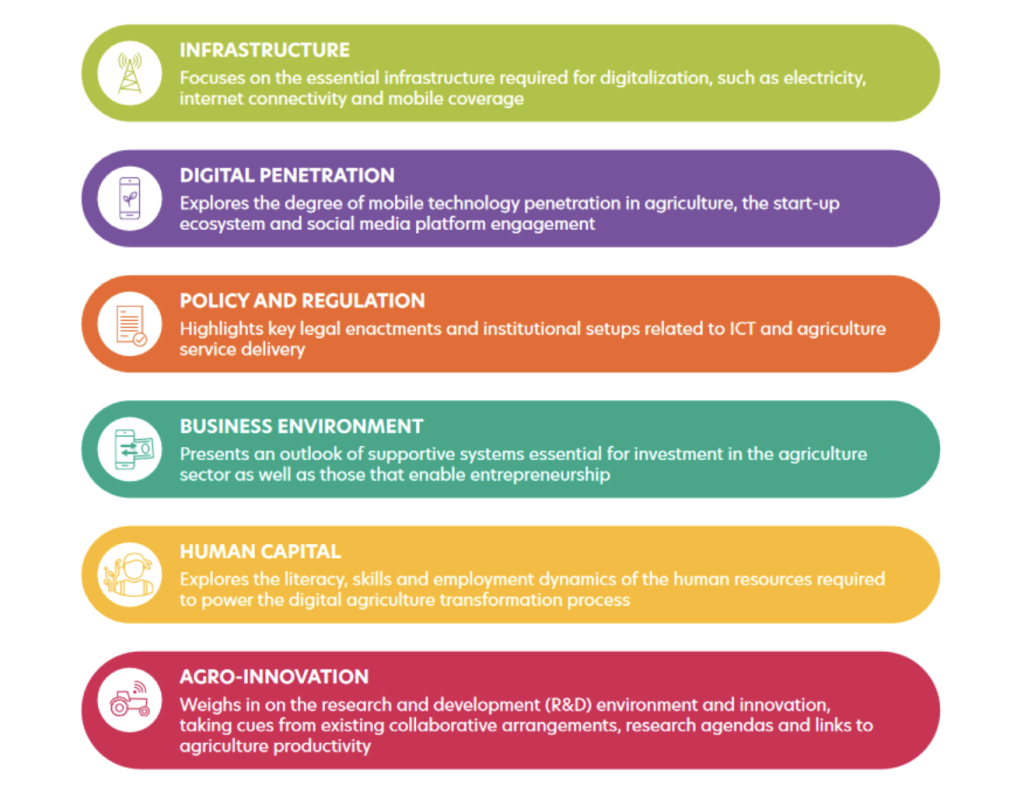Although some progress has been made, much of sub-Saharan Africa is still unconnected and large populations cannot fully realize the benefits of connectivity as about one-third of the population is out of reach of mobile broadband signals. Only 22 percent of people in the region have Internet access, suggesting there are more illiterate people than there are Internet users in the region (ITU, 2021).
To better understand the status of digital agriculture transformation in sub-Saharan Africa, the Food and Agriculture Organization of the United Nations (FAO) and the International Telecommunication Union (ITU) commissioned this study to assess and document the status of digital agriculture in the region, summarize key findings, and infer potential opportunities for digital agriculture transformation in sub-Saharan Africa in the respective 47 countries.
The process of digital agriculture transformation spans multiple issues including policymaking and regulation, limited access to finance, status of digital skills, and the need to understand and overcome existing digital divides, as well as access to infrastructure and information. Furthermore, the lack of broadband infrastructure in rural areas and connectivity to mobile devices, coupled with the limitations on inter-system data exchange present additional barriers and challenges that are considered and addressed within the 47 country profiles. The six themes cover the process broadly and present key enablers that need to be addressed when considering digital agriculture transformation.

KEY MESSAGES
The potential for digital agriculture transformation in sub-Saharan Africa is enabled by the continent’s youthful population and increased mobile penetration. Countries across the region are in varying stages of digital agriculture transformation, which creates an opportunity for the exchange of knowledge, expertise and lessons. However, an inclusive and collaborative process is essential so that no one is left behind.
Although the region has high potential for digital transformation, barriers still exist, such as limited infrastructure in rural areas, insufficient funding for agriculture, inadequate investment in research and development, agro-innovation and agricultural entrepreneurship, which are essential drivers for digital agriculture transformation.
An enabling business environment is fundamental to attract investment in digital agriculture.
The majority of countries in the region still face challenges in creating a favourable business environment, especially for start-ups.
Sub-Saharan Africa is served by multiple undersea cables. Prioritising the connection to these cables to improve broadband access for both coastal and landlocked countries is needed.
Undersea cables can also be complemented with national terrestrial broadband backbones that link both urban and rural areas.
It is essential that digital transformation for agriculture is anchored to addressing low digital skills in the population, especially among women, youth and rural populations, through customized digital skills development programmes.
Although there are existing policies on information and communication technologies (ICTs) and/or the digital economy, these are not aligned to existing agriculture policies, which hinders the process of digitalization in the agriculture sector. National strategies, therefore, need to be developed to support the digital transformation of agriculture.
As most interventions were at the production level, the digitalization process should encompass the entire agriculture value chain. As such, governments need to foster the transformation of inclusive agri-food systems by leveraging the potential of digital solutions across value chains.
Increased collaboration among countries, international organizations and private entities is to create an inclusive set of digital public goods in agriculture that are sustainable and scalable necessary to create an inclusive set of digital public goods in agriculture that are sustainable and scalable.
| Year of publication | |
| Authors | |
| Geographic coverage | AfricaSub-Saharan Africa |
| Originally published | 15 Mar 2022 |
| Knowledge service | Metadata | Global Food and Nutrition Security | Research and Innovation | Human capital |
| Digital Europa Thesaurus (DET) | Agriculturevalue chaindigital technologydigital transformationpolicymakingdigital skills |
